Communications
What to keep in mind
- A good connection between the Olympic Festival and the Olympic Games both in terms of content creation and technical link is the best foundation for good publicity of the event in the media.
- Most sport journalists as well as NOC’s communications experts will be at the location of the Games, which may create some challenges.
- Do not forget about regional and local media. They can play a very important role in communications activities.
- A close involvement of partners/sponsors as well as host cities/regions and sport federations is a must for the success of any communications campaign.
- Olympic trademarks-related rules are fully applicable to communications activities. Make use of the pre-event communications activities to remind your stakeholders of the rules related to the use of the Olympic symbols (= prevention of ambush marketing). For more information, see the Marketing chapter.
Main goals of the communications campaign
- Create a very close link between your Olympic Festival and the Olympic Games. The OF should be perceived as the home base of your National Olympic Team.
- Establish a clear association between your OF and Olympic values.
- Create awareness = encourage people to come to the OF.
- Generate exposure
Olympic Park Rio-Lipno 2016
The Region of South Bohemia, host of the event, organised a year-long campaign “South Bohemia - Olympic”, part of which was a roadshow promoting not only the OF, but also the benefits of physical activity in general- Provide appropriate visibility and exposure to Partners/Sponsors (a clear ROI for them) as well as to participating sport clubs and federations.
- Provide public authorities with the opportunity and space to communicate about the importance and the benefits of active and healthy lifestyle, etc. and closely cooperate with
- Target groups
- The communications campaign should not focus only on one target group, but it should be able to provide various content and use various communications means to strike a chord with various target groups. Keep in mind that “one target = one message” principle applies.
- Nevertheless, given the main rationale of the Olympic Festival, you should pay a special attention to families with children and youth.
- Expert public – journalists – needs to be also catered for.
Organisation
Management
Implementation of the communications campaign and decision-making
- NOCs will often work with external communications agencies. The extent to which the agency will be involved in the design and implementation of the campaign will vary depending on the experience, size and set-up of your NOC, as well as on the size and duration of your event.
- The main responsibility for the implementation, though, should be in the NOC’s hands – the Director of Communications should be in charge of the campaign and should allocate responsibilities and tasks.
- If more Olympic Festivals are organised in the same country, a decentralised approach can be considered (national coordination by the NOC, establishment of clear guidelines, and a communication manager/team/agency in each Festival).
- The communications team should always be given an appropriate training. For more information see the Resources chapter. For more information see the Resources chapter.
Communications guidelines/ toolkits
- It is highly recommended to prepare communications guidelines/toolkits both for the communications team (internal and external) and for the main stakeholders who will be involved in communications activities (sponsors/partners, cities/regions, sport clubs and federations).
- Guidelines for the communications team
- Content: summary of the goals and key messages, reporting guidelines (who approves what and when), brand guidelines, social media rules.
- Guidelines for stakeholders (partners/sponsors, federations, local authorities)
- Content: contact details of the communications team, key messages, brand guidelines and logos, tools for social media (examples of posts, tweets etc.) stock of photos, videos, press releases, etc.
- The easier the better → a turnkey solution is the best way to ensure stakeholders’ involvement
Media partners
- It is necessary to optimise the partnership with media partners for both locations – the Olympic Festival and the Olympic Games → it is crucial to start planning well ahead of the event.
- Stress exclusivity of the content to the partners.
- Use media partnerships to generate exposure.
- Focus in particular on national TV and dailies.
- Activate barter cooperation for this purpose.
Olympic Festivals Brno and Ostrava 2018
- Czech Television
- Media Partner of the Czech NOC, the Czech Television promoted the Olympic Festivals regularly on its channels since the winter of 2017 and made the event an integral part of its broadcast plan for the 2018 Winter Olympic Games.
- The broadcaster set up an Olympic studio at the Festivals (in Brno for the first part of the event and Ostrava for the latter part of the Olympic Games) and it broadcast live from Brno and Ostrava every day from 6 p.m. until 7 p.m. While the programme focused on the news from PyeongChang 2018 and the performance of the Czech Olympic Team, it included a 10-minute sequence dedicated specifically to the Olympic Festivals.
- Highlights from the Festivals were shown and participants were given an opportunity to ask Czech athletes present in PyeongChang questions.
- Czech Television studios were featured also in the 2014 and 2016 Olympic Parks organised by the Czech NOC.
- Deník
- Partner of the Festivals and one of the biggest dailies in the Czech Republic had its team at the venue. The journalists produced an „OF newspaper” every day, containing information and news about the OF activities, visiting Olympians, programme onstage etc. which was distributed at the Festival. Furthermore, an annex to the general newspaper dedicated to the OF was also published.
Rio House 2016
- The Belgian NOC had an agreement with a local TV to produce a daily report from Rio House (it was necessary to ask the national broadcaster, partner of the NOC, for consent).
Media partners and journalists were invited to the “Behind the scenes” of the Opening event to provide them with exclusive content.
Olympic Experience 2016
- The NOC concluded media partnerships with:
- De Telegraaf (advertisement and PR), the most important daily in the Netherlands.
- Radio 538 (production and broadcast of radio spots dedicated to the event).
- Exterion - billboard partner of the Dutch NOC – for exposure by advertising masts nearby the City of The Hague. For more information, see pictures in the Communications activities.
Services for the media
Rio House 2016
No “physical” press centre was created, but organisers ensured a good (secured) Wi-Fi connection for the press, which was highly appreciated.
Press/ media centres, mixed zones, accreditation
- Each Festival should feature a press centre, the size and technical solutions of which will depend on the size and set-up of your OF.
- All media outlets should have an access to your OF to report about it and its activities.
- An accreditation system for the media should be set up. It will provide you with a good overview of the general coverage of the event
Studios – TV and/ or radio
- It is crucial to negotiate with broadcasters their possible involvement as early on in the preparation process as possible – For more information, see the Organisation chapter.
- TV Studios: Olympic Park Sochi-Letná 2014, Olympic Park Rio-Lipno 2016, Olympic Festivals Brno and Ostrava 2018
- Radio Studios: Olympic Experience 2016, Rio House 2016, Olympic Festivals Brno and Ostrava 2018
Provision of content
For more information, see the Communications activities.
- Provide the media with images, pictures, and footage already before the event (iconic images). During your event, focus mainly on life content.
- Make sure that all interested media outlets are provided with:
- Contact person who will gather their requests, follow-up and provide them, with basic information including programme etc. at daily basis.
- Daily programme in the OF including information on what each club/federation is planning (sport activities, participation of known athletes, high-level competitions, cultural programme and any other occasion which may be interesting for the media).
- Practical information (details about the venue, rules, security, contacts, etc.).
- Athletes and other personalities to interview.
- Arrival of Olympians = a key occasion for the media
- It needs to be very well coordinated and planned minute-by-minute so that the media, as well as fans and partners, can be fully satisfied.
- For more information, see the Organisation chapter.
Monitoring
https://www.mediatenor.cz/en/
https://www.obi4wan.com/en/
https://www.coosto.com/en
https://www.kantarmedia.com
https://www.meltwater.com/uk/
- You are encouraged to use the regular media and social media monitoring tools and services of your NOC to cover the event. The media output should be analysed after the event and the economic impact calculated.
Crisis communications
Management and plan
Rio House 2016 - Activation of Crisis communication
An example of a crisis management tool developed for a public multi-sport event.
- It is highly recommended to prepare and implement a crisis communications plan (guidelines) which would apply to both locations – the OF and the venue of the Games.
- A crisis communications training (in the form of a clear document to follow, online training, workshop or any other form) where the guidelines would be presented and discussed should be organised for all people involved, including volunteers.
- Keep in mind that the division of the communications team between the OFs and the location of the Games may pose additional challenges. Clear reporting lines have to be established and followed.
- A regular contact between the (crisis) communications teams of the main stakeholders (main organiser, local authority, agency) is of the utmost importance. It needs to be very clearly defined who can report/communicate about what, where, and when.
How to recognise a crisis
- The media attack the very essence of the project and thus cast doubt on the underlying idea of the event. There is a risk that a bad reputation be created for the event and your NOC.
- A wave of criticism on social media arises (the topics may seem unimportant, but they are repetitive and gathering momentum). The media tend to treat them as supportive evidence.
- Funding of the event is often an issue of criticism (especially when the event is co-financed from public resources).
- Local political representation can also stir up anger towards the project, mainly when addressing the possible impact of the event on the venue, without highlighting the positive aspects and benefits.
Main rules for neutralising a crisis
- Be in touch with the media as much, and as closely, as possible – especially local ones – and never lie.
- Be active on social media and involve your social media networks in the activities.
- Turn cons into pros (e.g. we contribute to the cultivation of the area, offer employment opportunities to local people and companies, and support tourism in the area).
- Keep explaining the long-term benefits of the project and highlight its positive legacy (e.g. how many children have already partook in sports within the project). For more information see the Sustainability chapter.
- Do not be afraid to communicate the composition of your budget in advance (i.e. the involvement of public authorities – both local and national, sponsors, barter, quantify the activity of volunteers).
Olympic Park Sochi-Letna 2014
A great wave of displeasure and criticism coming from the local inhabitants who considered the given venue (public space) as "theirs" and claimed that:
- The event had no right to be there, it was not authorised.
- It was a ‘circus’, short-term entertainment for a huge amount of money.
- There was no need for such large media coverage since the Park was already overcrowded.
- The area of Letna would be destroyed as a consequence of the construction work (liquid nitrogen used for the ice would get into the soil and damage vegetation, etc.).
- It would be better to build a new stadium for such a great amount of money instead of funding an expensive project for a limited time and only for certain people.
- It limited their freedom, i.e. transport to the venue or parking had to be adjusted.
Communications response
- Main motto: “Complete transparency”.
- Main messages:The Czech NOC takes into account environmental considerations in the preparation of all its projects. It has cooperated with the city districts and other local authorities (the Letna Park was in fact revitalised – new grass, tree redevelopment).
- It was warm and a lot of ice had to be made, but we were the only ones in the Czech Republic who offered an ice area to the public (very mild winter).
- The Olympic Park was a non-profit, non-commercial project intended for the general public, from children to the elderly.
- A positive lasting legacy was ensured (e.g. resurfaced tennis courts for the public will permanently remain at the venue of the project).
Olympic Channel
In 2018, during the first edition of the Olympic Festival, the Olympic Channel provided content to the organisers to be used at the venues, and visited the Olympic Festivals in the Czech Republic from which it produced short videos featuring interesting stories from the OF.
- Details of the Olympic Channel’s involvement in the future editions of the Olympic Festival is yet to be specified.
- For National Olympic Committees: Contact the IOC NOC Relations department for more information
Tips and tricks
Plan well the pre- and post- event phase·
- Before the event = generate awareness and media buzz
- Visual impression is essential → Prepare a stock of images and footage of very good quality – both visually and content-wise - which can be used to promote the event (min. 1 MB for print).
- Focus on local exposure.
- Plan well the revealing of the names of ambassadors and the presentation of any special activity which will feature in your Olympic Festival.
- After the event
- Make sure that the OF is linked to your other activities also in communications terms - For more information, see the Sustainability chapter.
- Do not forget to follow-up closely with the host city/region after the event and make use of any positive developments generated by the organisation of the Olympic Festival (e.g. creation of a new sport club) for promotion and communications purposes.
Tailor-make content and make it widely available
- Tailor the content to each target group and each communications channel.
- Do not underestimate the need for easily accessible and frequently updated practical information (programme, weather forecast, transport etc.). Use appropriate communications means (e.g. social media, local media or mobile apps) to spread such information.
Interact with all stakeholders
- Good interaction with visitors is key.
- Involve and cooperate with sport personalities and other celebrities (show business, politicians etc.) as much as possible to make the event exciting for both visitors and the media.
- Encourage sport federations and eventually professional sport clubs in the area to get involved in the communications and promotion activities prior to the start of the OF (e.g. by providing them with the communications toolkit).
Activate local media
- Target local media to create local exposure and communicate about practical matters during the event. Do not forget that local media can play a very important role should you need to activate crisis communications, especially in the event of an accident.
- Involve an appropriate mix of national and local stars and legends in the programme. Often, local stars will be more interesting to both local media and local visitors.
- Stories about visitors or volunteers can be also of interest to the local media.
- Encourage local clubs to get in touch with their local media outlets to promote their activities in the OF. Assist/support the federations/clubs in the process, including on social media.
Make good use of social media
- It is all about engaging with fans, visitors, athletes and stakeholders. Direct response on questions generates satisfied visitors.
- The management of social media needs to be ensured by experienced professionals.
- Good channel to pass on practical information to visitors – fast and interactive.
- Prefer quality of content to its quantity (especially photo and video content).
- Use social media channels which work well in your country. Not all of them will have the same reach in all countries.
- Make full use of your existing social media accounts and profit from their cross-posting potential. Even though the creation of a specific social media account for your Olympic Festival is not recommended, do set-up an event page under one of your existing accounts.
- Cooperate closely with your team at the venue of the Olympic Games, as well as with Olympians and other personalities.
- Check the Case Studies to learn about the social media reach of the past OFs.
- Use social media (esp. Facebook) to facilitate the recruitment process of volunteers and to communicate and pass on information within the organising teams (volunteers, participating clubs, staff members etc.). For more information, see the Resources chapter.
Consider creating an event website
Olympic Festivals Brno and Ostrava 2018
Stand-alone domain
www.olympijskyfestival.cz
Olympic Festival Rogla 2018
Integrated in the NOC’s domain
http://festival.olympic.si
- An event website can be a very useful and practical tool to promote the event and communicate with visitors. However, it is not a must.
- Content of the website
- Basic information about the event.
- Programme.
- Reservation system for sport venues and activities, if applicable.
- Ticketing management, if applicable.
- Integrated social media feed and links to the social media accounts/events.
- Presentation of sponsors/partners.Information for the recruitment of volunteers.
- Photo/ video gallery.
Consider using paid advertisement
- The need to use paid advertisement will depend on the readers’/consumers’ behaviour in each country and on the resources available.
- Make good use of existing partnerships with media partners. – link to the media partners above
- Try to activate the marketing tools of the host city/ region → a corresponding clause could be part of the host city/ region contract.
- Invest in the promotion of your content on social media. Paying for the visibility of you posts on social media will ensure a better impact of your campaign.
- Being creative and having a good PR manager can mean that most of the promotional space in print and online media can be done in a form of advertorials and/ or for a low price.
Olympic Experience 2016
The Dutch NOC made a deal with the City of the Hague for branding of trams and displaying posters in the city centre (City Light Vitrines - CLV). For more information see the pictures in the Communications activities.
Olympic Festival Grenoble 2018
The French NOC paid for improving the visibility and impact of its online banners to enhance its campaign on social and online media.
Consider producing local Olympic Festival “newspaper”
- You can cooperate with a media partner on its production and/or activate your media team together with external provider. For more information, see the example of the daily "Denik".
- Such newspaper is a great a great tool for communication with visitors as it would provide them with important up-to-date information, but also for promotion and activation of your sponsors and partners.
Communications activities
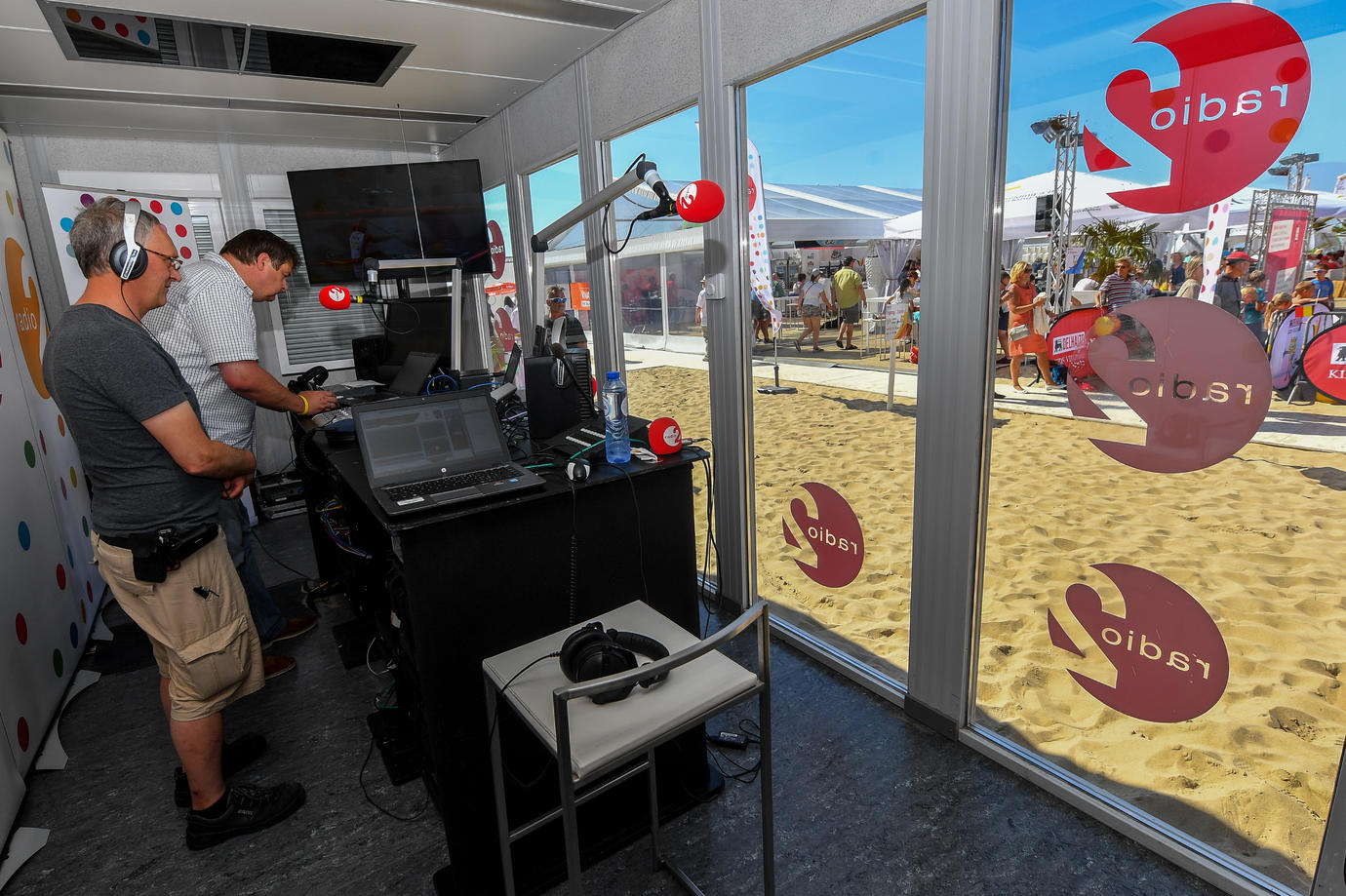
Television
| Timing |
|
| Tools |
|
| Content |
|
Radio
| Timing |
|
| Tools |
|
| Content |
|
Print media and their digital versions
| Timing |
|
| Tools |
|
| Content |
|
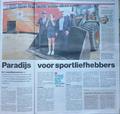


Social Media
| Timing |
|
| Tools / Channels |
|
| Content |
|





Out-of-home advertising (OOH)
| Timing |
|
| Tools |
|
| Content |
|
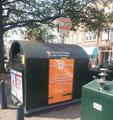
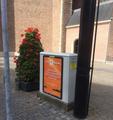

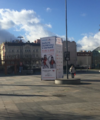




Other activities
| Topic | Examples |
| Roadshows |
|
| Programmes in schools |
|
| Children/youth journalism |
|
| Programme for disadvantaged groups (e.g. refugees) |
|
| Newsletters |
|





In 2018, for the second time, the Dutch Olympic Committee has organiseda “Children Press Conference” on the occasion of the Olympic Day.A group of children got the chance to ask famous Olympiansand Paralympians any questions they wished and enjoy the role of sport reporters for one day.The event, which is part of the extensive “In the classroom” project of the Dutch NOC targeting schools,was broadcast on YouTube and Facebook.
The Programme aims to provide journalists-debutants (18-24 y/o) with a very practical and hands-on experience at a large-scale multi-sports event organised by the Czech NOC – the National Youth Games. Every two years, the selected group of young journalists takes up the role of full time reporters, and, under the mentorship of a senior sport editor, provides a full coverage of the event. Learning how to work under pressure or how to come up with, and pursue, interesting stories, the programme has helped a number of its participants to land a job in major news media outlets.
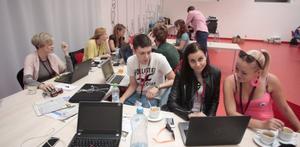
To print a page, you must first select chapters for printing.
























